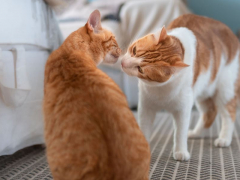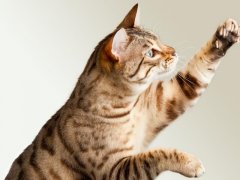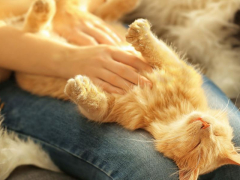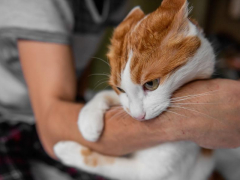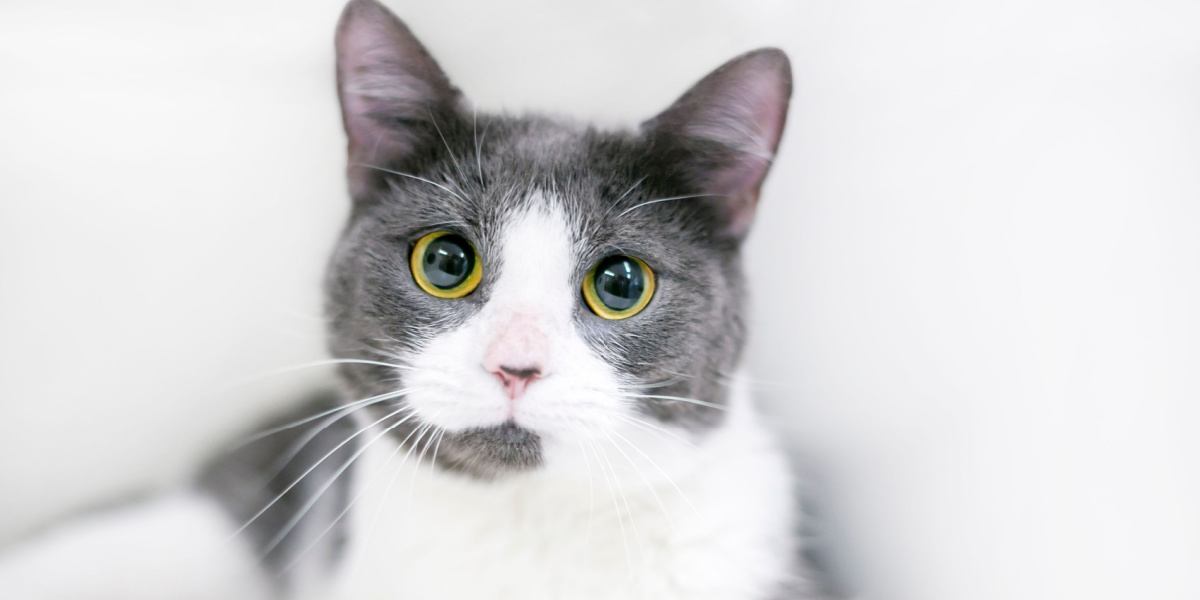
Cats have very distinctive eyes in many varying beautiful colors and shapes. Cats have extremely good sight that they use to hunt in the dark in the wild, so their eyes are adaptable to difficult lights and environments. The iris is the colored part of the eye that you can see and the pupil is the black part within the center that changes shape and size. The pupils in cats appear as vertical slits, rather than horizontal like ours.
Like you and I, your cat’s pupils get larger and smaller by reflex – which means they don’t have to think about it, it just happens subconsciously!
What Does It Mean When a Cat’s Eyes Are Dilated?
Why do they need to change size and shape then? When your cat has dilated pupils, they let in much more light to the back of the eye and this lets them see better in darker environments. When there’s lots of bright light, your cat decreases the size of the pupil to let in less light as too much bright light can damage the eye – like if you look at the sun!
As well as changes in light, there can be a few other reasons for your cat’s eyes to dilate. Some health problems can cause your cat’s pupil size to increase for extended periods of time so it’s worth knowing about them and taking your cat to the vet if you have noticed this.
Also Read: Cat Vision Vs. Human Vision: Who Has Better Vision?
Behavioral Reasons for Dilated Cats Eyes
Low Light Levels Around the House
As we touched on above, low light can cause your cat’s eyes to dilate so they can see better. If you live in a fairly dark house, especially during winter with shorter day lengths, you might well notice your cat’s eyes look more dilated than normal.
It isn’t anything to worry about as it’s a totally natural body mechanism! Just make sure their pupil dilation decreases again when you turn on brighter lights. Dilated pupils in low light are an excellent reflex to maintain your cat’s vision so they don’t bump into things in the dark.
Fear or Excitement
Fear and excitement can be other natural and normal causes of pupil dilation in cats. Kittens especially may well have wide dilated pupils when they play purely because they’re just so excited.
Watch out for tell-tale body language that might indicate your cat is feeling fearful, such as a hunched back, crouching, hiding under furniture, or not interacting with you as normal. Do your best to reassure your cat and remove any potential fearful stimulus if you can. Once they are back to their relaxed, normal self then you can check their eyes to see if they look normal again.
Again, excitement can be a very common reason for dilated eyes so cat owners might notice their cat has huge pupils when they’re about to give them dinner or about to pounce on their favorite toy!
Health Problems for Dilated Cats Eyes
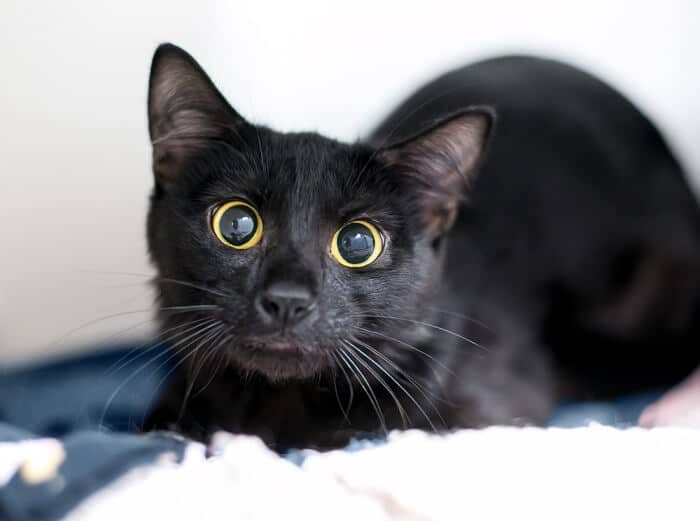
Cats with permanently dilated pupils may be suffering from a health condition
If your cat seems to have one or both eyes with dilated pupils for long periods of time or permanently, it is worth ruling out some underlying diseases that might be causing this!
A trip to your vet to do some diagnostic tests is definitely worthwhile if you’re worried your cat might have a health problem causing unusual pupil dilation.
Anisocoria
Anisocoria is the medical term for unevenly dilated eyes. If you notice your cat has one eye with a pupil much more dilated than the other this could indicate a whole variety of diseases.
Common underlying causes for anisocoria affecting your cat’s health are:
- Glaucoma is when the intra-ocular pressure (pressure inside the eye) in your cat’s eyes is too high. The affected eye will be the one with the dilated pupil.
- Damage to the retina (the back part of the inside of the eye).
- Iris atrophy, which is when the iris starts to lack tissue. Often this is a change associated with ageing.
- Infectious diseases such as feline immunodeficiency virus, toxoplasmosis, or feline leukemia virus.
- Neurological diseases such as Horner’s Syndrome. This can be caused by a number of things such as a brain tumor, spinal cord or brain trauma, or an ear infection.
- Corneal ulcers on the surface of the eye. You might notice your cat looking squinty and with discharge coming from the eye as corneal ulcers can be quite painful.
- Hypertension – otherwise known as high blood pressure! Abnormalities with vision e.g. dilated pupils can be one of the most common symptoms of feline hypertension. This can be quite dangerous as if your cat’s blood pressure is allowed to soar, this can gravely affect the retina and cause it to detach which will lead to blindness. An underlying condition that causes hypertension itself can be kidney failure which is very common in cats. Look out for other clinical signs of kidney disease in your cat such as weight loss or a change in your cat’s behavior.
- The different sizes of pupils are quite easy to spot when your cat looks at you face-on so keep an eye out!
If your cat has one pupil larger than the other, contact your DVM for an appointment.
Hypertension
Otherwise known as high blood pressure, abnormalities with vision e.g. dilated pupils can be one of the most common symptoms of feline hypertension. This can be quite dangerous as if your cat’s blood pressure is allowed to soar, this can gravely affect the retina and cause it to detach which will lead to blindness. High blood pressure can also impact on other organs such as the heart and kidneys.
An underlying condition that causes hypertension itself can be kidney failure which is very common in cats. Look out for other clinical signs of kidney failure in your cat such as weight loss or a change in your cat’s behavior.
Blindness
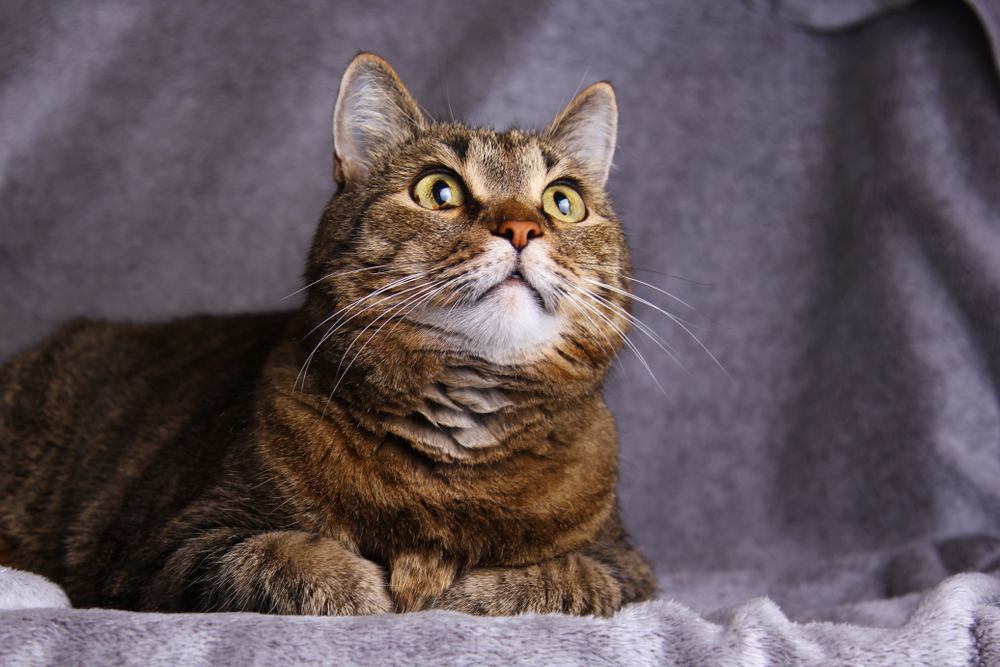
Cats can lose their vision as they age, just as humans can
Older cats can start to lose their sight just as they naturally age, and as they do, large pupils can be a common finding as they dilate them to increase the amount of light they can get to their retina in order to try and see a bit better, especially in dim light.
However, if your cat is young, fit, and healthy but is starting to show signs of blindness, such as bumping into furniture or not wanting to jump around the house, it is definitely important to get your cat checked out by your vet straight away. They will be able to examine your cat and run the relevant diagnostic tests to make sure your cat doesn’t have any serious underlying diseases.
The blindness itself isn’t often painful or fatal for your cat but potential underlying causes might be, such as brain or eye tumors.
Pain
Cats who are in pain will often have big, wide pupils and might also show pain-related behavior. Look out for signs that your cat might be in pain, such as resentment of being picked up, aggression, meowing, or hiding. Common causes of pain in cats are arthritis, trauma, or injury.
Dysautonomia
Feline dysautonomia is a disorder of the neurological system in cats. The autonomic nervous system controls many involuntary and reflex actions, such as pupil dilation and constriction. Symptoms of this condition can include dilated pupils as well as protruding eyelids, difficulty swallowing, dullness, loss of appetite, respiratory signs and diarrhea.
why Is Older Cats’ Eyes Are Always Dilated?
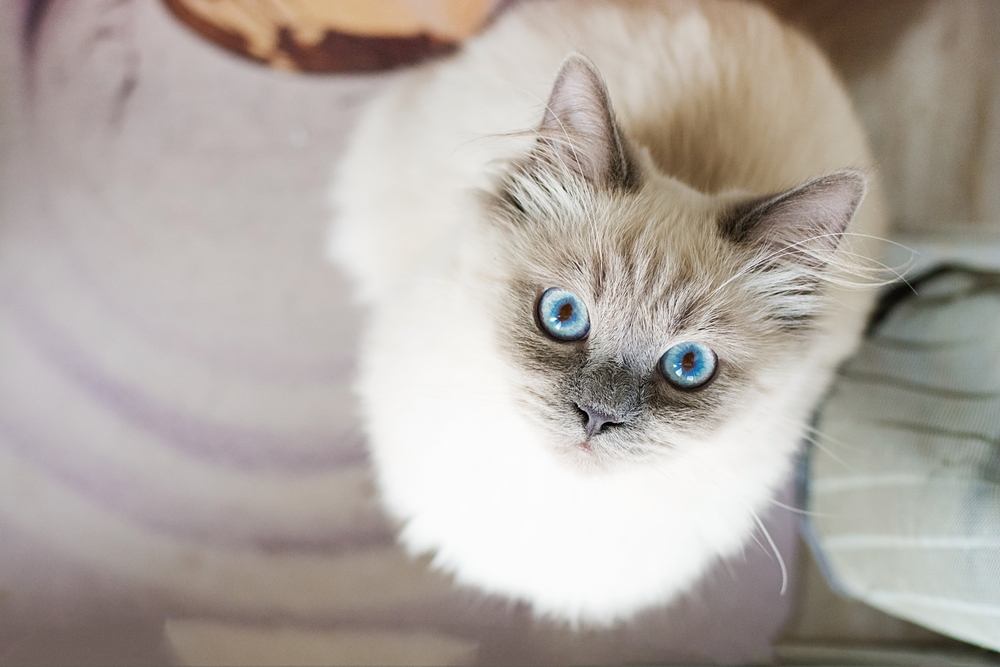
Eyes are delicate and important structures, so knowing what is normal and what is not is a useful skill for cat owners
Your cat’s eyes are extremely clever and adaptable to lots of different environments and emotions. Dilated pupils can occur for a number of day-to-day reasons, and as long as they go back to normal size in brighter light levels or after a period of excitement, there shouldn’t be anything for cat owners to worry about.
However, if you notice long-term dilated eyes in your senior cat, it is definitely advisable to make sure nothing is affecting your cat’s health that could be more serious. Your veterinarian will be able to advise you on the best course of action for your cat when you seek their help.
Also Read: Epiphora In Cats: Causes, Symptoms & Treatment
